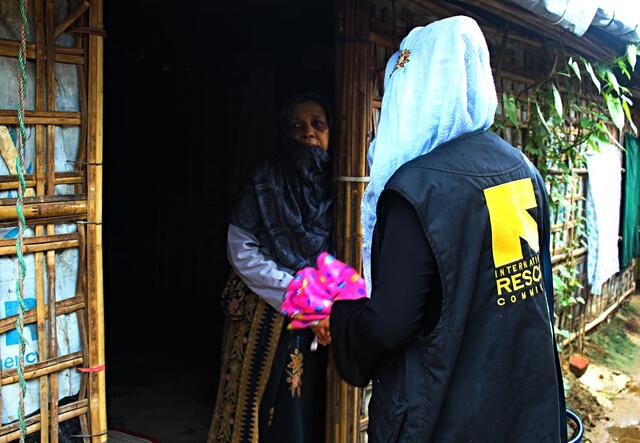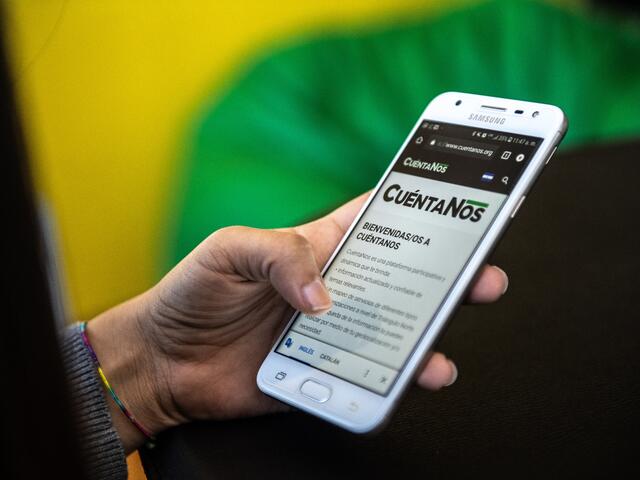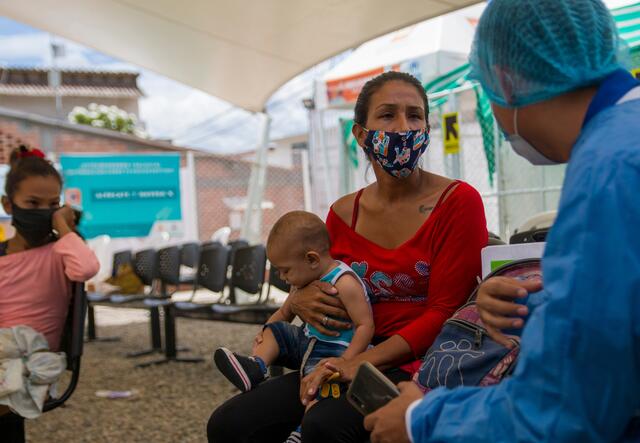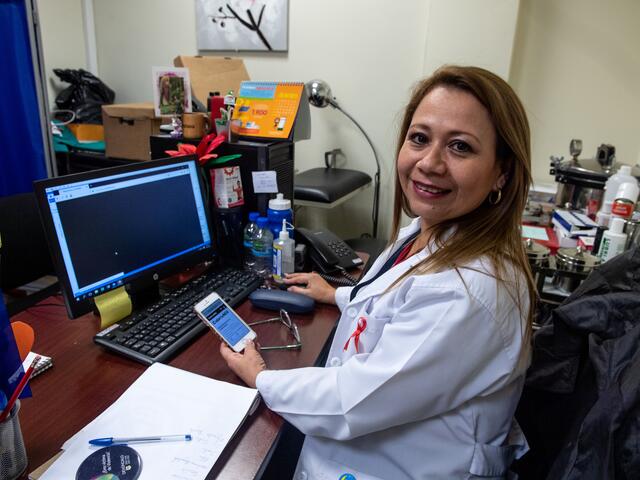From inaccurate health advice to deceptive propaganda, misinformation and disinformation related to COVID-19 are spreading around the world and taking lives. The International Rescue Committee (IRC) is especially concerned about their impact in countries where we work, such as Syria and El Salvador, that were already in crisis when the pandemic hit.
COVID-19 cases skyrocket in places where infection control measures aren't respected and where health authorities are ignored. Health workers become targets of violence and stigmatization, as IRC teams have already seen while fighting Ebola.
"Information can be lifesaving, but people will only take on information that they trust," says Andre Heller, director of Signpost, an IRC-led digital information service for those affected by conflict and crisis.

What's more, he explains, health information must be linked with access to critical resources and services, because in a complex crisis—such as the war in Syria—people are not only overwhelmed with the amount of health information but they are also worried about other things like their physical safety and ability to get enough food.
If information is scientifically accurate but not adapted to their specific needs, people will look for answers elsewhere, including social media. "False or misleading stories spread six times faster than the truth on social media platforms like Twitter," Heller says, "and health misinformation receives four times as many views on Facebook as reliable information shared by [agencies] like the World Health Organization.

"If we fail to provide localized information, misinformation and disinformation will result in massive loss of life and a hobbled public health response."
If we fail to provide localized information, misinformation and disinformation will result in massive loss of life and a hobbled public health response.
That's why IRC teams worldwide are tracking misinformation and disinformation that may have adverse effects—such as keeping people from seeking out COVID-19 testing or treatment, or receiving an eventual vaccine—and working to counter them. For example:
- In El Salvador, the IRC's CuentaNos platform, part of Signpost, is helping to debunk incorrect information related to so-called natural cures that "could help" COVID-19 patients, such as drinking teas made with certain leaves or herbs.
- In Bangladesh, where nearly 1 million Rohingya have found shelter from violence in Myanmar, IRC community health workers, who are refugees themselves, are helping to counter the perception many people have that the virus is not in the camps.
- Inside Myanmar, it has been extremely difficult to even reach people affected by the conflict in Rakhine state with information about COVID-19 due to restrictions on humanitarian access and internet access. Community meetings we held early in the pandemic indicated that people in conflict-affected areas were the least likely to be reached by and recall public health messages.
- In northwestern Syria, where there is low COVID-19 testing and serious gaps in knowledge about how the virus is spread, there's a particular stigma around wearing masks. One person we spoke with told us, "[I] saw a child pick up a mask from the ground and put it on to scare the other children, saying 'Corona! Corona!' And all the other children ran away from him. They think that those wearing the masks are the ones infected." Ahlan Simsim, our early childhood development program with Sesame Workshop, is using WhatsApp and text messages to share critical health messages, such as the importance of handwashing and mask-wearing, with families.
- In Afghanistan, where the health system has been shattered by decades of conflict, we've heard misinformation circulating that Muslims are immune to the virus, and that closure of mosques and religious schools would further its spread. People have also told us of false reports that those even suspected of having COVID-19 would be injected with poison in the hospital.

Since March, the IRC has seen an uptick in disinformation in the countries where we work—specifically the manipulation of health messaging for short-term political gain. This is most notable in Colombia, which hosts millions of Venezuelans uprooted by violence and instability in their home country. People we assist there have told us they believe the virus is a conspiracy created by the government to divert attention from issues such as corruption, violence, unemployment and social inequality.
This makes services like Signpost—which now reaches 2 million people worldwide in seven languages—all the more indispensable. Signpost uses websites, Facebook, Whatsapp, blogs and apps to provide reliable information to refugees, asylum seekers and others displaced by crisis. As many as 75 percent of Signpost users surveyed said it is their only source of information for what help is available to them amid unfolding humanitarian crises.

In September, the IRC and its partners—which include Mercy Corps, Google, Cisco, Trip Advisor, Twilio, Box, Facebook and Zendesk—launched a new Signpost platform in Colombia. The service, InfoPalante, provides Venezuelans with information about their rights, jobs, and access to health care. Says Meghan Lopez, the IRC's regional director for Latin America, "Access to timely and accurate information is especially crucial for vulnerable populations fleeing crisis who are in dire need of localized information, and, what’s more, are at specific risk to COVID-19."
Signpost is also launching in Mexico, where the IRC is assisting asylum seekers stuck in limbo in dangerously crowded conditions at the U.S. border by the Trump Administration's "Remain in Mexico" policy.
While the pandemic may be the subject of political theatre, the virus is a killer and has a disproportionate impact on marginalized communities.
"While the pandemic may be the subject of political theatre, the virus is a killer and has a disproportionate impact on marginalized communities," says Signpost director Andre Heller.
The IRC is committed to expanding Signpost so that more people affected by conflict and crisis have a reliable alternative to the misinformation and disinformation swirling around them. We have also created a global taskforce to help ensure those we serve—even in the hardest-to-reach communities—actively participate in developing and sharing the information they need to stay safe, access vital services, and make healthy decisions for themselves and their families throughout the COVID-19 pandemic.
As Heller explains, "information is aid in and of itself."